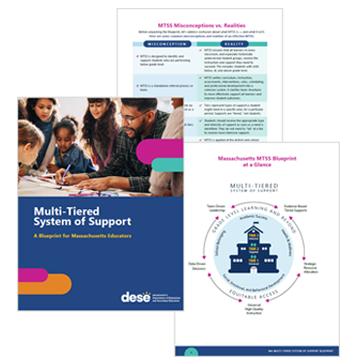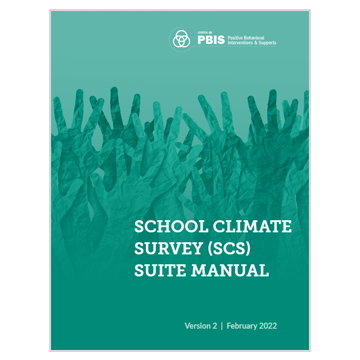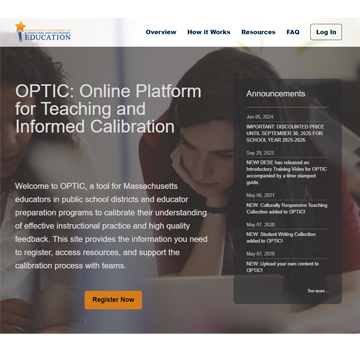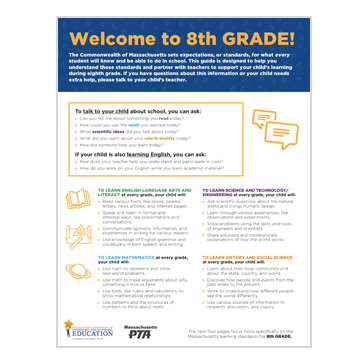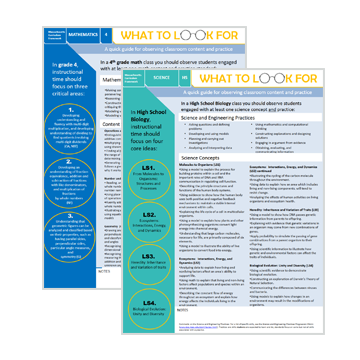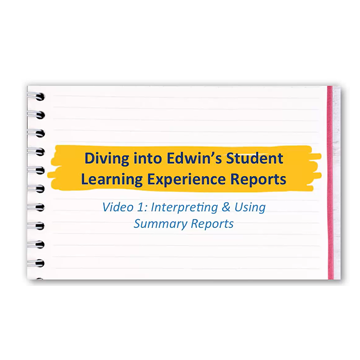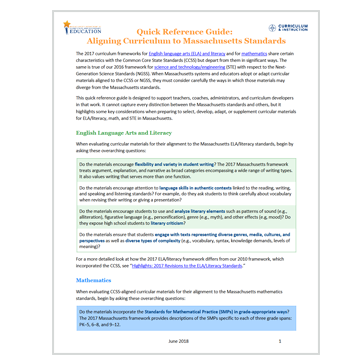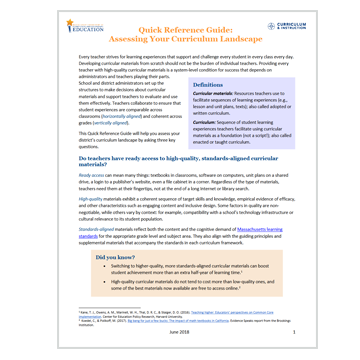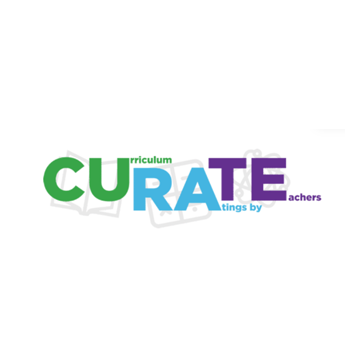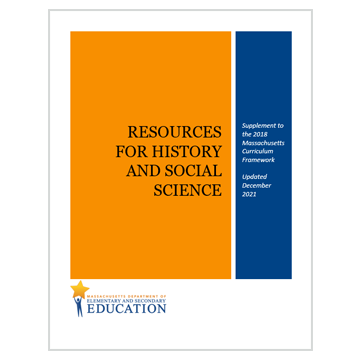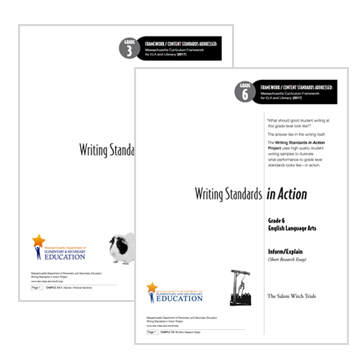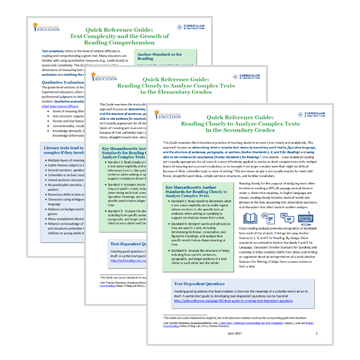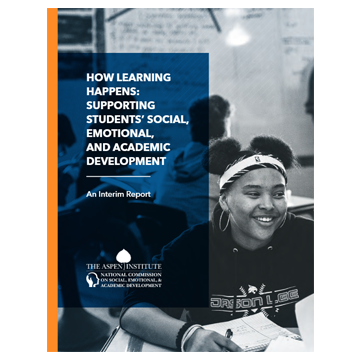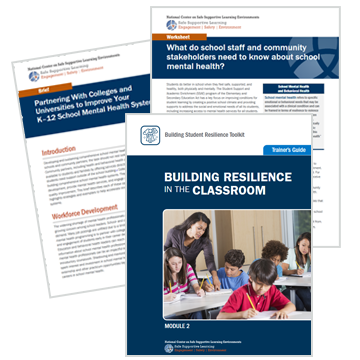Resource Profiles
New Resource Search
← Return to Find Resources | MTSS
Resource Results
2025 Massachusetts MTSS Blueprint
The updated 2025 Massachusetts MTSS Blueprint unpacks MTSS from three perspectives: why it is important, what it entails, and how to approach implementation. It reflects a holistic view of student development and MTSS implementation lessons from the field and research.
The School Climate Survey Suite
The School Climate Survey Suite is a set of four multidimensional surveys to measure student, teacher, administrator, faculty, and family perceptions of school climate. The surveys are brief, reliable, and valid for assessing perceived school climate among students in Grades 3-12. The manual was updated 2022 (Version 2).
OPTIC: Online Platform for Teaching and Informed Calibration
OPTIC is a dynamic professional learning platform that supports educators to develop and refine a shared understanding of high-quality teaching and feedback using over 100 videos of classroom instruction aligned to the MA Curriculum Frameworks and the Model Classroom Teacher Rubric.
Family Guides to Massachusetts Learning Standards
Family-friendly guides to learning standards for each grade level, designed to structure and strengthen school-family partnerships.
Social and Emotional Learning in Math
Resources describing connections between the Massachusetts Mathematics Curriculum Frameworks and development of student social and emotional skills.
What to Look for Observation Guides: Science, Technology, Engineering, and Mathematics
These grade and content-specific What to Look For (WtLF) Observation Guides are designed to support observations of classroom content and practice. They highlight what the teacher and students should be doing in a standards-aligned classroom.
Student Learning Experience Report
This EDWIN report helps school and district leaders understand equity gaps in students’ learning experiences with effective educators; for example, the report shows how often students had assignments with different types of teachers over the past one to five years. This series of three videos and related guidance explain how the report works and how to interpret and use the data.
Quick Reference Guide: Aligning Curriculum to Massachusetts Standards
A quick reference guide to tailoring nationally available curriculum products for use with Massachusetts standards.
Quick Reference Guide: Assessing Your Curriculum Landscape
Use this tool to do help evaluate systems and structures supporting curriculum at the school or district level.
CURATE Curriculum Materials Reports
DESE convenes panels of Massachusetts teachers to review and rate evidence of alignment and quality of comprehensive core curricular materials. Findings for each resource product are published in a user-friendly report for educators across the Commonwealth to consult and make informed, local decisions about curricula.
Resources for History and Social Science: Supplement to the 2018 Massachusetts Curriculum Framework
A compendium of curriculum, content, and cultural resources aligned to topics in the 2018 Massachusetts History and Social Science Curriculum Framework
Writing Standards in Action
A library of authentic student writing pieces, annotated to show what mastery of the writing standards looks like in action.
Quick Reference Guides: Text Complexity
Three quick reference guides explaining how to evaluate text complexity and analyze complex text to support reading comprehension.
Parent and Educator Guide to School Climate Resources
Produced jointly by the Department’s Office of Elementary and Secondary Education (OESE) and Office for Special Education and Rehabilitative Services (OSERS), this guide provides best practices and resources that parents and educators can utilize as they work to achieve a positive school climate, lower disciplinary issues, and enhance school safety.
Online TAP Social Emotional & Behavioral Health Training Series
These free training modules for educators are part of the Clough Foundation Training and Access Project (TAP) Online series, which offers free courses designed to build the capacity of school communities to address social-emotional learning and behavioral health. TAP is a part of the Boston Children’s Hospital Neighborhood Partnerships Program (BCHNP).
How Learning Happens: Supporting Students’ Social, Emotional, and Academic Development
This landmark consensus report issued by the National Commission’s Council of Distinguished Scientists unites scholars from multiple fields to affirm the interconnectedness of the social, emotional, and academic components of learning.
National Center for Safe Supportive Learning Environments Resources
The National Center on Safe Supportive Learning Environments (NCSSLE) is a training and technical assistance center funded by the U.S. Department of Education to address factors that result in disciplinary problems, poor conditions for learning, and educator burnout. NCSSLE has developed a number of tools, online modules, and other materials related to these topics and more.
Nashville Case Study: Implementing Social Emotional Learning Across the District
Excellent Edutopia series on how Metro Nashville Public Schools is bringing coherence and alignment to social emotional learning implementation.
MA DESE Conditions and Habits of Successful Partnership Guidance
MA DESE conducted research on successful partnerships, including schools with turnaround efforts supported by one or more partner. The interviews, focus groups, and research led to the conclusion that there are necessary conditions at the outset of a partnership, and habits throughout the partnership, that make the difference between successful and unsuccessful relationships. This guidance aims to provide clarity around the necessary conditions, as well as a set of tools for districts and partners.
Massachusetts Educator Evaluation Training Materials and Modules
Training materials to support use of the Massachusetts educator evaluation framework. Includes facilitator tools, videos, handouts and slides needed to provide educator training workshops.
← Return to Find Resources | MTSS
